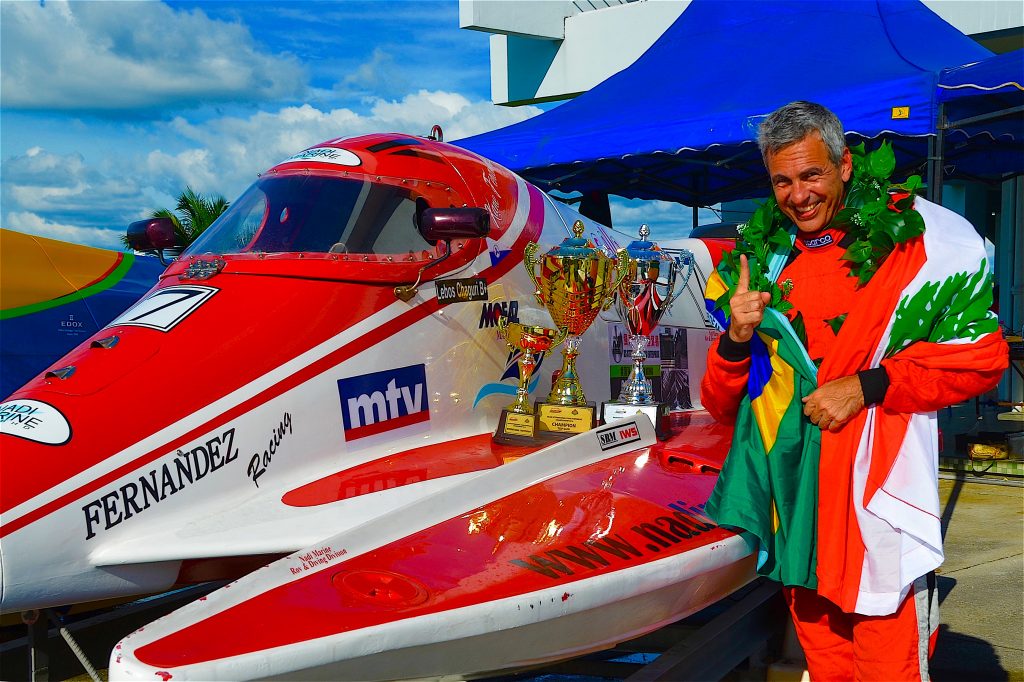São Paulo – Five-and-a-half meter-long boats made from carbon fiber, weighing 300kg. With 400 hp reaching up to 200km/h. Steering one of these, the Brazilian of Lebanese origin Lebos Ribeiro Chaguri won the 2018 edition of the F3000 Powerboat World Championship. The powerboating competition, a high-velocity boat race, took place in Muar, Malaysia, between December 1st and 2nd. ‘I’m ecstatic. And I got to be the first in the “Drag Race” (short-distance race) and in the final!’, the pilot explained to ANBA.
Staying away from races and boats seems to be out of the Brazilian Lebanese’s plan. ´Not running is out of my mind. Everyone says: You can stop now, since you’ve won. I say no.’ And he proved his point in 2012. He was already competing internationally when he had to be temporarily away from the sport. ‘I was looking for sponsorship. I’d had a serious accident, went to the ICU in Sharjah, then in Dubai, and then in Brazil, but still in the ICU. I had thrombosis, pulmonary embolism, and a blood clot in the brain,’ the pilot told.

As fast as he steers, Lebos told his tale of races and victory from then on. ‘I was in a 9-month recovery and in 2013, when I was released, I went to the race and won the bronze medal. I wondered if I could win, but I just sped up and succeeded,’ he says. ‘In 2014 I competed but had another accident. After that I went to a competition in Colombia. In 2015 I participated in the Formula 3000. In 2016, I didn’t. In 2017 I was in the F3000 and in the Endurance Cup in Colombia. I won bronze and a silver medal there, and it was the first time ever a Brazilian achieve this feat in the series. The events were supported by the Colombian government and the Powerboating Federation of that country,’ he told.
Formula 3000
Now, in 2018, the Brazilian driver’s team in the F3000 Powerboat World Championship is Fernandez Racing, which had three racing boat drivers this year. Lebos was the only one in his team to make the podium in the final race. He explains a few things about different powerboating categories: “In F1H20, all boats and engines are the same, and the teams are assigned boats through a draw,” he explains regarding the category which features national teams. As for F3000, where he’s the reigning champion, there are differences: each team has their own boat and engine, and preparation is allowed. The teams do not relate to nationality.

Lebos explains that F3000 grew big in Asia. The World Championship is held once or twice a year, when points from both phases get added. In 2018, the tournament lasted only two days. “Boat against boat. You go up against everyone and whoever has the most wins, wins. On Fridays there’s practice. On Saturday, there’s practice in the morning and qualifying in the afternoon. The final race will take place on Sunday. I placed second in qualifying, and first in the final race.”
The longest straights in the final race circuit were 400-meter long ones – not much, from what the racer says. “You go from 0 to 100 km/h in three seconds. And from 0 to 200 km/h in 4 seconds. The g-force goes up to 7G on curves. In F1, for instance, it’ll be 3G. Aircrafts will get up to 5G, or 6G at most,” says Lebos.
A resident of São Paulo, he explains that he puts more work into physical conditioning than the racing itself. “We don’t practice, we just get in for the race. You take practice on Friday and then you go all the way, you go through your regular racing procedure. What we do throughout the year is physical conditioning: gym, swimming, exercise,” he explains. The driver does stints with his boat at boat shows often. Last May, for instance, saw him honored during The Potential of Lebanese Diaspora, a conference in Beirut where he discussed his life story.
As for racing, he now wants to get back into F1H2O. “I got space in F1. Now, I’m looking for sponsorship. Right now, I got support from MTV Lebanon. I do have a team to get back in F1, but I’m going to look for a sponsor first. They want me to be there. They won’t let just anyone in. They have every world champion in different powerboating categories,” he concluded.
Translated by Guilherme Miranda & Gabriel Pomerancblum




